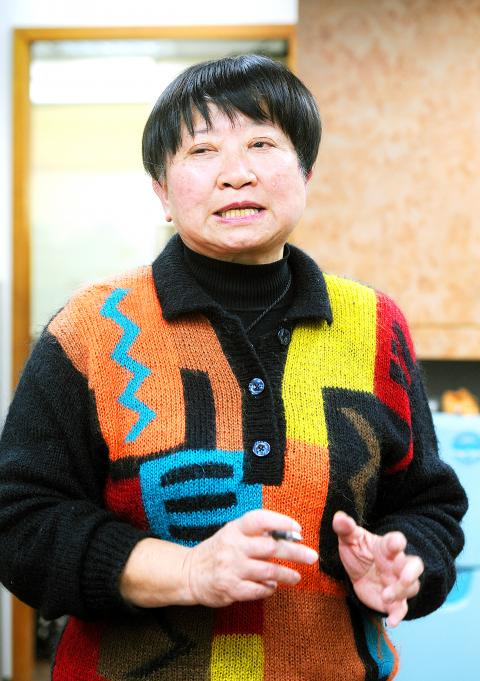People First Party Legislator Chang Show-foong (張曉風) yesterday caused an uproar and drew criticism from civic groups over her remarks that the government should provide aid to women “who should have married, but have not,” and that men should marry local women instead of foreigners.
“There are many excellent women who should have married, but have not; they have been abandoned by Taiwanese men,” Chang said during a question-and-answer session at a meeting of the legislature’s Internal Administration Committee. “This could lead to a great loss for the nation.”
Chang, a noted essayist, also said that instead of marrying local women, many men choose to marry foreign women, “but it’s biologically more normal for people to choose their spouse within the country.”

Photo: Fang Pin-chao, Taipei Times
“I don’t know what happened to the male creatures in this country that they must find female creatures abroad to marry,” Chang, 71, said. “Maybe it’s because foreign brides are easier to control and they don’t even make a sound when they are beaten.”
Ministry of the Interior officials were quick to disagree with Chang.
“We do try to help those who want to get married to find partners by organizing social events, but in this country everyone is free to choose whether they want to get married or not,” Children’s Welfare Bureau director-general Chang Hsiu-yuan (張秀鴛) said. “I think international marriages are a trend.”
Minister of the Interior Lee Hong-yuan (李鴻源) echoed Chang Hsiu-yuan, saying that many Taiwanese men married women from Southeast Asia because they are from economically and socially disadvantaged backgrounds and they find it difficult to find spouses within the country.
“The ministry does everything it can to promote marriage,” he said.
Chang Show-foong’s remarks also drew fire from civic groups.
“I was shocked to hear what she [Chang] said,” said Lorna Kung (龔尤倩), a supervisor of the Taiwan International Family Association. “Apparently, Chang Show-foong knows nothing about international families.”
Kung said that most people who marry foreigners do so out of choice, not necessity, and that all marriages are based on different reasons.
“It’s a fact that most Taiwanese men who marry women from Southeast Asia are from a more disadvantaged social or economic background, and such couples are already targets of discrimination,” Kung said. “Chang Show-foong’s remarks only fuel such discrimination — and I regret to hear that.”
Gender/Sexuality Rights Association Taiwan secretary-general Wang Ping (王蘋) said the increasing number of unmarried women was a sign that Taiwanese women are becoming more independent, adding that Chang Show-foong’s remarks were inappropriate.
“In the past, women’s only objective in life was to get married, which made them dependent on their families, but the situation has changed,” Wang said. “Women nowadays have become more economically independent — they have started to consider whether marriage is necessary. Some want to make different choices, and that’s not a bad thing.”
Wang said some women want to get married, but cannot find a suitable spouse.
“That is also a sign that women are more free and independent,” Wang said.

CHAOS: Iranians took to the streets playing celebratory music after reports of Khamenei’s death on Saturday, while mourners also gathered in Tehran yesterday Iranian Supreme Leader Ayatollah Ali Khamenei was killed in a major attack on Iran launched by Israel and the US, throwing the future of the Islamic republic into doubt and raising the risk of regional instability. Iranian state television and the state-run IRNA news agency announced the 86-year-old’s death early yesterday. US President Donald Trump said it gave Iranians their “greatest chance” to “take back” their country. The announcements came after a joint US and Israeli aerial bombardment that targeted Iranian military and governmental sites. Trump said the “heavy and pinpoint bombing” would continue through the week or as long

TRUST: The KMT said it respected the US’ timing and considerations, and hoped it would continue to honor its commitments to helping Taiwan bolster its defenses and deterrence US President Donald Trump is delaying a multibillion-dollar arms sale to Taiwan to ensure his visit to Beijing is successful, a New York Times report said. The weapons sales package has stalled in the US Department of State, the report said, citing US officials it did not identify. The White House has told agencies not to push forward ahead of Trump’s meeting with Chinese President Xi Jinping (習近平), it said. The two last month held a phone call to discuss trade and geopolitical flashpoints ahead of the summit. Xi raised the Taiwan issue and urged the US to handle arms sales to

State-run CPC Corp, Taiwan (CPC, 台灣中油) yesterday said that it had confirmed on Saturday night with its liquefied natural gas (LNG) and crude oil suppliers that shipments are proceeding as scheduled and that domestic supplies remain unaffected. The CPC yesterday announced the gasoline and diesel prices will rise by NT$0.2 and NT$0.4 per liter, respectively, starting Monday, citing Middle East tensions and blizzards in the eastern United States. CPC also iterated it has been reducing the proportion of crude oil imports from the Middle East and diversifying its supply sources in the past few years in response to geopolitical risks, expanding

Pro-democracy media tycoon Jimmy Lai’s (黎智英) fraud conviction and prison sentence were yesterday overturned by a Hong Kong court, in a surprise legal decision that comes soon after Lai was jailed for 20 years on a separate national security charge. Judges Jeremy Poon (潘兆初), Anthea Pang (彭寶琴) and Derek Pang (彭偉昌) said in the judgement that they allowed the appeal from Lai, and another defendant in the case, to proceed, as a lower court judge had “erred.” “The Court of Appeal gave them leave to appeal against their conviction, allowed their appeals, quashed the convictions and set aside the sentences,” the judges